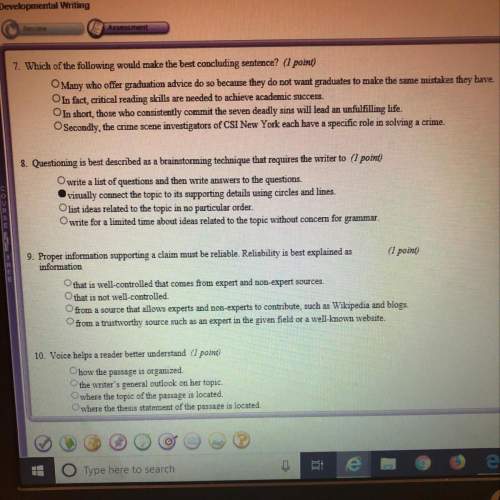Read this excerpt from Susan Butcher and the Iditarod Trail.
What is the best inference...

English, 26.03.2020 03:22 sedratkawaiah13
Read this excerpt from Susan Butcher and the Iditarod Trail.
What is the best inference a reader could make from this
excerpt?
Meanwhile "Wild Bill" faced a number of problems. The
temperature had dropped to fifty degrees below zero. Speed
was important, but he could not push his team too hard. The
dogs' lungs might frost from breathing heavily in the Arctic
air. To protect his own lungs, Bill breathed only through his
nose. The bitter wind howled and hurled snow in his face.
The trail was a blur.
The only choice Bill had was to move as quickly as
possible.
Bill did not understand how to handle the cold Arctic
weather.
Moving too quickly could cause Bill and his dogs to
become ill or die
Bill could not see the trail because of how quickly his
team was moving

Answers: 1
Another question on English

English, 21.06.2019 16:00
In the odyssey which is most effective paraphrase of the passage
Answers: 2

English, 22.06.2019 02:00
3. how could the following sentence be rewritten as an exclamatory sentence? how dangerous was the saber-toothed tiger? a. tell someone how dangerous the saber-toothed tiger was. b. the saber-toothed tiger was dangerous. c. the saber-toothed tiger was dangerous! d. no change is necessary. c. the saber-toothed tiger was dangerous!
Answers: 3

English, 22.06.2019 02:30
Which sentence is correctly punctuated? a. i haven’t found a new job, and i don’t plan to look for one until i have to. b. my work is piling up—day to day—and i can’t seem to get caught up. c. i know things could be worse (they have been in the past).
Answers: 1

English, 22.06.2019 03:30
In just over one hundred years, between 1701 and 1810, 252,500 enslaved africans were brought to barbados—an island that occupies only 166 square miles (making it, today, one of the smallest countries in the world). the english then set out to conquer more sugar islands, starting with jamaica, which they took from spain in 1655. in the same period that the 252,500 africans were brought to barbados, 662,400 africans were taken to jamaica. thus, sugar drove more than 900,000 people into slavery, across the atlantic, to barbados and jamaica—and these were just two of the sugar islands. the english were eagerly filling antigua, nevis, saint kitts, and montserrat with slaves and sugar mills. they took over much of dutch guiana for the same reason. seeing the fortunes being made in sugar, the french started their own scramble to turn the half of the island of hispaniola that they controlled (which is now haiti), as well as martinique, guadeloupe, and french guiana (along the south american coast near dutch guiana), into their own sugar colonies, which were filled with hundreds of thousands more african slaves. by 1753, british ships were taking average of 34,250 slaves from africa every year, and by 1768, that number had reached 53,100. –sugar changed the world, marc aronson and marina budhos how do the authors use historical evidence to support their claim? x(a) they use secondary sources to show how french and english monarchs were indifferent to enslaved people. x(b)they use secondary sources to show that enslaved people often fought for their freedom after arriving in the caribbean. the answer is: (c)they use facts from primary sources to show how countries increased the number of enslaved people to produce more sugar. x(d)they use primary source interviews to show that countries could make more money in trading sugar without using enslaved people.
Answers: 1
You know the right answer?
Questions












History, 13.03.2020 17:27











